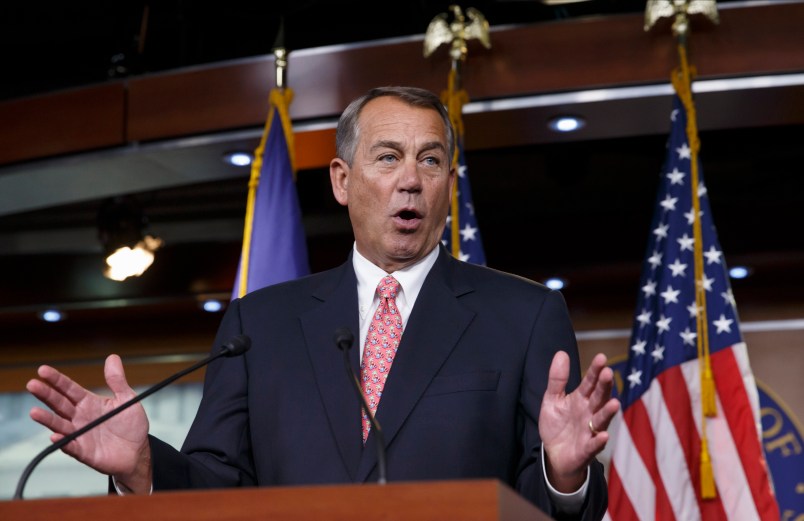Rep. John Boehner survived reelection to a third term as Speaker of the House as the 114th Congress convened on Tuesday, but not without the embarrassment of a record number of defections.
Twenty-five Republicans voted “present” or for a candidate other than the Ohioan, who was selected as the GOP conference’s choice for Speaker by a voice vote in November. His margin of error was 29 members of the full House, although two-dozen members were absent on Tuesday which altered the calculus.
The defectors were Reps. Justin Amash (MI), Brian Babin (TX), Rod Blum (IA), Dave Brat (VA), Jim Bridenstine (OK), Curt Clawson (FL), Scott DesJarlais (TN), Jeff Duncan (SC), Louie Gohmert (TX), Paul Gosar (AZ), Chris Gibson (NY), Scott Garrett (NJ), Tim Huelskamp (KS), Walter Jones (NC), Steve King (IA), Thomas Massie (KY), Mark Meadows (NC), Rich Nugent (FL), Gary Palmer (AL), Bill Posey (FL), Scott Rigell (VA), Marlin Stutzman (IN), Randy Weber (TX), Daniel Webster (FL) and Ted Yoho (FL).
The tea party rebels, many of them a constant thorn in Boehner’s side, criticized him for refusing to fight President Barack Obama on immigration and for his handling of the $1.1 trillion spending bill passed last month, among other things. But even if they succeeded in denying Boehner victory on the first ballot, they lacked an endgame as they failed to recruit an alternative who had significant support within the conference.
Gohmert and Yoho, two firebrands, stepped forward as candidates for Speaker. In the final hours before the vote, conservatives tapped Webster to run for the House’s top job. All three were nominated on the floor.
The votes of the rebels were scattered and revealed no consensus for a candidate other than Boehner. Some of the defectors voted for Republicans who weren’t even nominated, such as Rep. Jim Jordan (OH) and even Sen. Rand Paul (R-KY).
In the end, Boehner won 216 votes.
The vote for Speaker has traditionally been a formality that breaks down along party lines with few, if any, defections. In 2013, a chaotic and disorganized tea party revolt led to 12 defections against Boehner for Speaker, the highest in decades, and just a handful of votes away from forcing a second ballot.
This time, with the Republicans controlling their largest House majority in generations, the number defections was larger, but so was Boehner’s cushion with his members.
Democratic members, with some exceptions, voted for Rep. Nancy Pelosi (D-CA) to be Speaker. She will keep her position as the minority leader in the new Congress.







I feel so bad about Louie Gohmert–what fun that would have been!
…so how did Boehner win?